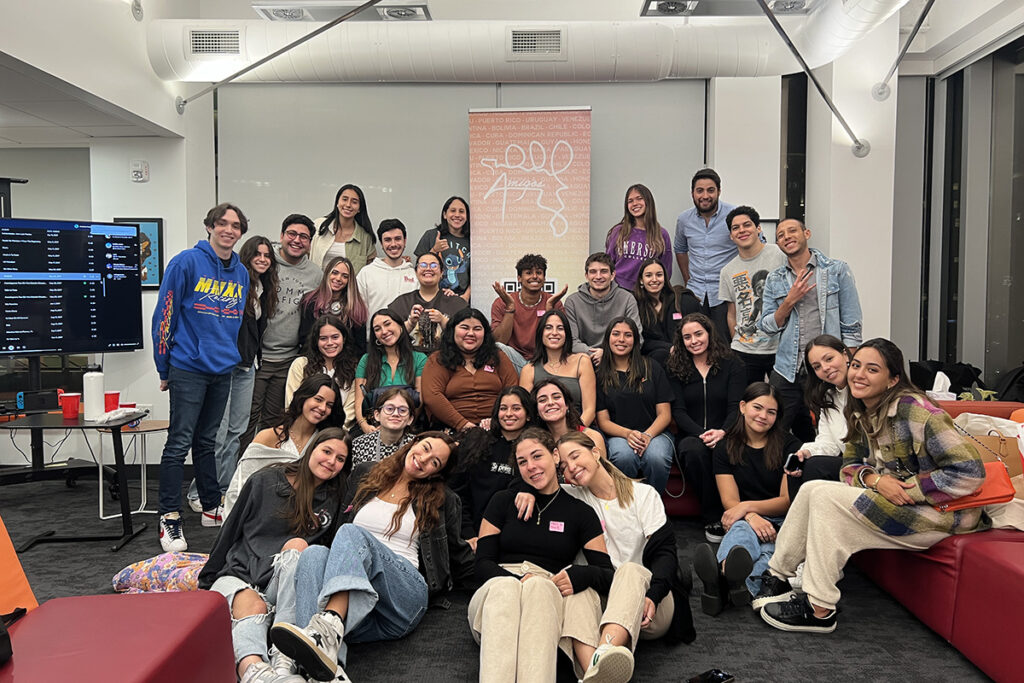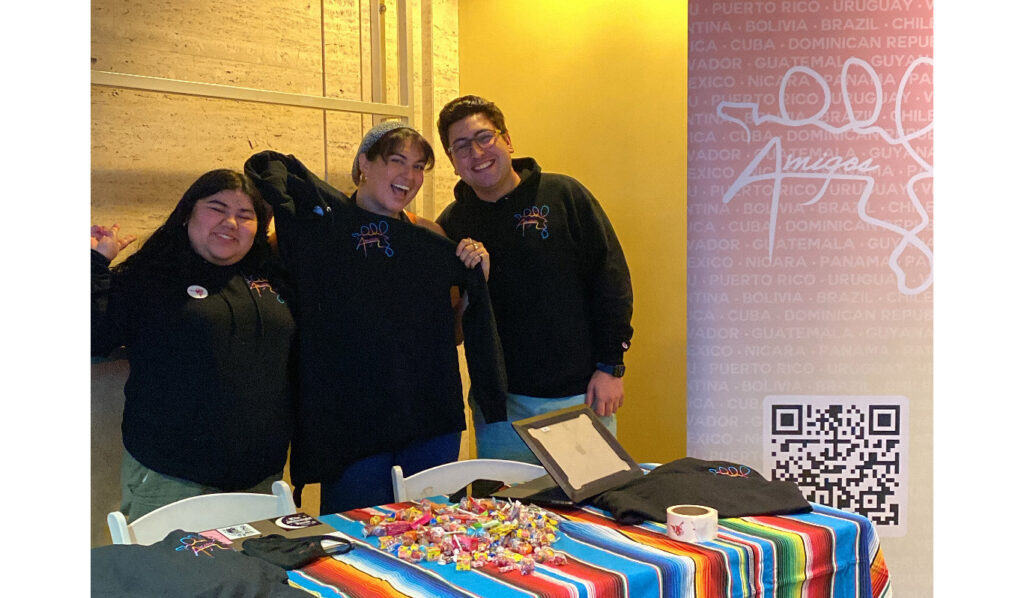What’s in a Name? Weighing Hispanic, Latino/a, Latinx, Latine with Amigos

National Hispanic Heritage Month began September 15. But the student organization Amigos is currently in conversations about how to refer to the month – which celebrates the people and cultures of Spain, Mexico, the Caribbean, and Central and South America – when gender conformity is often in flux.
In addition, some international students regard themselves as Hispanic, but not Latino, because they are from Spain. But someone from Brazil may not consider themselves Hispanic, because they speak Portuguese.
An informal anonymous poll was recently taken by Amigos of what to call the monthlong celebration, and while there was a frontrunner, the results were far from unanimous: 24 for Latino; 10 for Hispanic; 6 for Latine; 5 for Latinx.
Without a consensus, students discussed what they’d like the month to be called.
“I use Latino. I identify as Latina,” said Daniella Lopez White ’24, co-chair of marketing for Amigos, who is Mexican-American and grew up in Hawaii. “It’s Latino, because it’s gender neutral.”
“Everyone has a different point of view,” said Juanma Suárez Teissonniere ’23, former vice president and current student advisor to Amigos. “Spanish speakers tend to prefer Latino. [In my experience] the Emerson community, in general, prefers an ‘x’ at the end. I identify as Latino. But at Emerson, because there’s such a diverse group of people, the term Latinx is a gender nonconforming term.”
Spanish is a gendered language, so a speaker traditionally would use Latino for men and Latina for women. A group incorporating both would be Latino. Latinx opens up wider possibilities for gender, including those who are nonbinary, but adding an “x” at the end of a word is not a typical Spanish construct.

Many believe that Latinx is more often used by non-Spanish-speaking individuals, and is almost a colonization of Spanish by English speakers.
“I think using the ‘x’ is bringing in English to Spanish,” said Teissonniere, who grew up in Puerto Rico. “But we’re Emerson, so we use Latinx.”
While in high school in Los Angeles, Ana Pineda-Gonzalez ’23 used Latina. At community college, she learned about pronouns other than she, he, him, and her. The topic spoke to her greatly; so much so that she wrote an essay for El Vaquero, Glendale Community College’s school newspaper: “The Importance of Latinx: How Latin Americans Feel About The Term“.
At Emerson, she saw that self-identifying terms were very important in the community. She started using Latinx to be more inclusive, and self-identifies as Latine. She also uses Latine for nonbinary people, and feels the spelling more comfortably fits within the Spanish language. Like Pineda-Gonzalez, many are starting to use Latine for nonbinary people instead of Latinx, because a final “e” is more natural to Spanish diction.
“It is such a complex issue. Personally, I keep it to the context of what audience I’m with, because there is no consensus, because the community is so diverse,” said Elisanett Martinez, Intercultural Program Coordinator. “Emerson is a robust Latinx community, but the issue with calling it Latinx is that a lot of the population is international students.”
Latine can be a workaround, and came about in the last few years from younger generations. Martinez said she only recently became acquainted with the term.
Using Latine or Latinx is pushing a societal conversation that not everyone relates to, said Martinez. Some people might have different citizenship statuses, and Latinx might not fit everyone. Hispanic or Latine may be more fluid and nonbinary.
“Here we are in the Emerson community, in the U.S., celebrating a U.S. holiday. But what are we celebrating? And what does it mean to people who celebrate it, but [who] are not Americans?” said Martinez.
Using the correct self-identifying term for a group or individuals is very important, particularly in the Emerson community. Martinez said she identifies as a Black woman who loves women, who is of Dominican descent, and is first-generation.
“I very much identify as an American, but have much emotional attachment to my Dominican lineage, my upbringing and heritage,” said Martinez. “For me, Latinx encompasses my entire identity. Hispanic is one dimensional and doesn’t leave room for the entire person of who I am.”
The Evolution of LGBTQIA+
Just as Hispanic, Latino, Latine, and Latinx are being discussed, there is also another evolving acronym commonly used in the Emerson community. The majority of the Emerson community uses the term LGBTQIA+, a descendent of LGBT (lesbian, gay, bisexual, trans). Not originally part of the acronym, the ‘A’ can stand for ally or asexual.
“The ‘+’ is leaving room for possibility, for other things,” said Martinez. “Some people are really attached to labels and find it comforting. Some people don’t like the label at all, and don’t like to say that they’re one thing, sexually. Some prefer the word ‘queer’ and feel it encompasses a bigger identity. LGBTQIA+ allows anyone to identify. You could identify with the ‘L’ and another letter in the alphabet, or the ‘+’. It’s almost a validation, ‘OK, they see me.’”
Self-identifying terms are not set in stone. They are fluid. A person who identifies as bisexual may then move onto another letter. Martinez said the best thing to do when misidentified is to politely correct the person, state what you prefer, and if needed, have a conversation.
Let’s Celebrate!
While self-identifying terms continue to change, the monthlong celebrations are just that — a celebration of culture and identity.
“Amigos holds a celebration and there’s always food and music, and it’s always a good time,” said White. “I want something like that, where it’s not just us celebrating our culture, but also inviting people to celebrate our culture. I want to be in a space this month where you’re allowed to be yourself. I would love to be in space where I can be loud and proud with it.”
Outside of the heritage celebration, Pineda-Gonzalez also wants Emerson to celebrate the Day of the Dead on November 1. Day of the Dead (Dia de los Muertos), with Mexican origins, is a time to remember, honor, and celebrate friends and family members who have died.
Teissonniere said Amigos is organizing a number of activities this year, such as a salsa event where anyone can attend, dance, or learn to salsa. Alumni are also being invited to participate in events to stay involved with Amigos, as well as networking opportunities for all.
You Are What You Say You Are
At the end of the day, self-identification comes down to one thing.
“If someone wants to be called something, call them that. But a white person from Connecticut should not be telling me how to use Latinx or Latine,” said White. “If I were in Amigos and someone from Venezuela said Latinx, I respect it – you do you. You’re a part of that community. It is a self-identifying term. It’s tough to put the entire Latino community in a box.”
Martinez feels there is change in the wind.
“I think we’re shifting in society. It’s less of a consensus and it’s more about the individual and respecting the individual of how they want to identify.”
Martinez said she looks at self-identifying titles in terms of generations.
“Look at incoming [first-year] students. Gen Z – they’re not just having the conversation, they are living it. I have seen an active change in their priorities and just overall behavior. They are inspiring.”
Categories